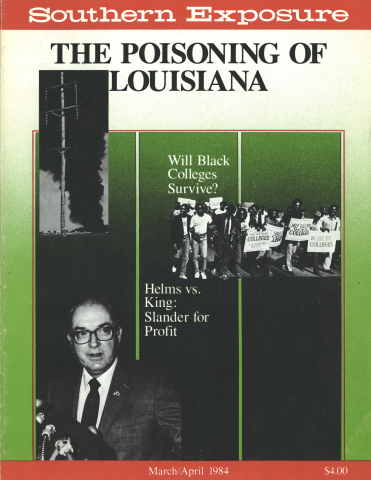
This article originally appeared in Southern Exposure Vol. 12 No. 2, "The Poisoning of Louisiana." Find more from that issue here.
Fairmont, WV — "If one sick child goes home well or with hope for a healthy life, it's worth it," says Mary Ann Watson. She has been a nurse's aide in the newborn nursery at Fairmont General Hospital for 19 years.
Born in Fairmont, of a mother who took in washing (on a washboard) and ironing for the neighbors and a disabled father, Mary Ann learned early about compassion and hard work.
When she was six years old, her mother gave birth to her last child. Mary Ann was sent next door during the delivery. Strong-willed Mary Ann ran home twice to see what was going on. The second time, the kind old doctor permitted her to stay; she even helped clean up her new brother. Ever since, Mary Ann has loved caring for infants.
"When I was in high school, they let me out of the last morning class and the last afternoon one to go home and help prepare meals for the family," she recalls. Eventually, Mary Ann had to leave high school and go to work on the local Westinghouse lamp assembly line to help care for the family.
She left Westinghouse in 1950, when she and her husband had a son, whom she proudly proclaims "the joy of my life." But John Edward died of asthma at age 10, and she never had any other children.
In 1964, Mary Ann was employed as a nurse's aide at Fairmont General Hospital, and finished second in her training class. This marked the beginning of her long and colorful tenure there. Early on, a supervisor told her, "Aides are a dime a dozen." Mary Ann felt she was forced to work for mere dimes, too: there were frequent double shifts, sometimes seven days a week, for 64 cents an hour.
"That supervisor's comment made me so angry," she says. "The aides were doing all the work. It was like slave labor."
Although there was no available recourse, Mary Ann was not about to sit idle through this exploitation. She came from a long line of labor union workers. Her father was a sheet metal roller at the local aluminum plant, and both grandfathers and two great uncles had been coal miners. This background, and her own convictions, incited her to protest.
Mary Ann and her co-workers petitioned the hospital board for union recognition, but the board refused even to meet with them. Although health care workers were then excluded from National Labor Relations Act protection, Mary Ann and the others agreed to strike.
The winter of 1964-65 was long and bitter with no strike benefits and only food donations. But the underpaid workers remained united. With the help of other unions, they forced the hospital management into negotiation. Fairmont General became the first hospital south of the Mason-Dixon line with a union.
Her participation in the 1964-65 strike and two others since then have won Mary Ann a wide reputation as a dedicated worker. She currently serves as vice-president of her local union; secretary-treasurer of the Marion County Labor Federation and its political education arm, COPE, and of West Virginia's Industrial Union Council (AFL-CIO). An active labor lobbyist, she meets and interviews many politicians and candidates.
"I learned the ropes from many good friends over the years," Mary Ann says. "The labor movement has broadened my life, developed me personally, and educated me about issues so that I deeply appreciate my work and people and union relationships."
Mary Ann transforms her lessons in the political arena into practical use in the community. She now serves as a board member of a local community health center. And she still takes great pride in being a nurse's aide. These days she even helps orient new nurses to the nursery, teaching them many things not found in classrooms or textbooks about newborns.
Mary Ann Watson, rank-and-file night shift nurse's aide, may be "just another health care worker" to some. But few people in any profession exhibit her courage and determination to improve conditions for working people.
Tags
Sharon Watkins
Sharon Watkins is a freelance writer in Rivesville, WV. (1984)

